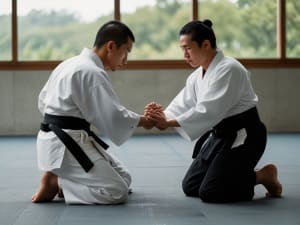
What are the Foundational Values of Martial Arts? Respect and humility hands down. They are core principles taught in every martial arts discipline. Cultivating these characteristics has always been extremely important in the growth and development of any child's upbringing. It can be the difference between the success and failure in any social interaction. From business transactions, social exchanges, and even more so in personal relationships. Having these as the base of someone's character keeps their moral compass pointing north, their integrity intact, and will foster strong bonds in any social setting they happen to be a part of. In the current settings though, there seems to be a limited resource for these to be taught, whether that be team sports or chess club. But often times they are found outside the home, and my (biased) opinion is, in the dojo/dojang/gym, is one of the best places to find it. So, lets take a look at how some of these instances take place, all while forging the body and tempering the mind.
Respect in the Dojo: In a traditional dojo, often times this is seen as soon as a student enters the building. Most bow to, or salute the flag, and bow to their training partners and teammates after every exchange.The dojo is a sacred space where learning and growth occur, and respect is crucial in maintaining its sanctity. Practices such as bowing when entering and leaving the dojo, addressing instructors properly, and treating equipment with care are all manifestations of respect. These rituals teach practitioners to honor their training environment and everyone in it, reinforcing discipline and appreciation for the art and its heritage. That value and respect pours over to every environment they spend their time, they value and take care of the things they have and the people they care about.
Humility as a Learning Tool: Humility in martial arts is about recognizing that there is always more to learn, regardless of one's level of expertise. This attitude allows martial artists to remain open to feedback, learn from defeats, and continuously seek improvement without ego getting in the way. It encourages students to appreciate their progress while acknowledging the efforts and strengths of others, fostering a supportive learning atmosphere. The media kind of does this a disservice as martial artists in the public eye have an image and ego to uphold for entertainment value. But if you ever have the opportunity to meet, train with, or cross paths with, often still uphold these values in every day. This is more the rule, than the exception.
Impact on social Behavior: The values learned through martial arts extend far beyond the dojo. Respect and humility influence how individuals interact with others in society. These values can lead to better communication, enhanced empathy, and more respectful interactions in both personal and professional settings. Practitioners often find these principles beneficial in conflict resolution and in leadership roles, where respect and humility are essential for success.
Respect for opponents in competition: In martial arts competitions, respect for one's opponent is paramount. Competitors bow to each other before and after matches, demonstrating mutual respect regardless of the outcome. This practice teaches athletes to honor their opponent's skill and effort, which is crucial for maintaining sportsmanship and dignity in competition. It highlights that every opponent is a teacher, offering lessons in skill, perseverance, and character.
Role of Instructors in Cultivating Values: Instructors are the torchbearers of martial arts traditions, including the teachings of respect and humility. They are role models who exemplify these values through their actions and words, setting a standard for their students. By demonstrating respect for all students and showing humility in their teaching, instructors create a respectful learning environment and encourage their students to embody these values both in and out of the dojo.
Cultural and Historical Context: Respect and humility in martial arts are deeply rooted in the cultural contexts of their origin. For example, the Japanese concept of "rei" (respect) in martial arts is connected to broader social norms that value harmony and order. Understanding these cultural and historical roots can enrich a practitioner’s appreciation of martial arts and provide a deeper insight into why these practices are so integral to training.
Promoting a Positive Community:Respect and humility are essential for fostering a positive community within martial arts schools. They promote an inclusive and supportive atmosphere where all students feel valued and motivated to learn. This community spirit helps in retaining students and attracting new ones, contributing to the school’s success and longevity.
By diving deeper into these aspects, we can see how integral respect and humility are to the philosophy and practice of martial arts, shaping not only skilled practitioners but also individuals who carry these values into all areas of their lives. I have come across many people in my life, good and bad interactions, emotionally charged and sometimes physical. People can say many things about me, but one thing they can't say, is that I am disrespectful. In a world where your word may be all that you have, the importance of these values can not be understated.
-Peak


